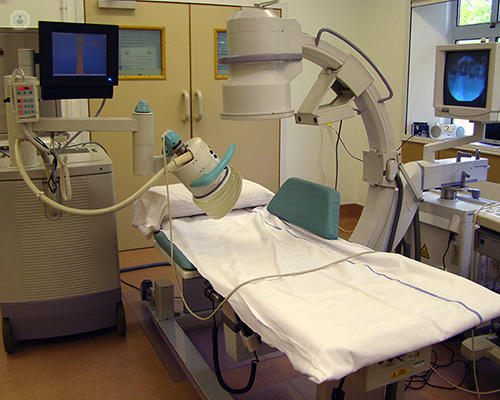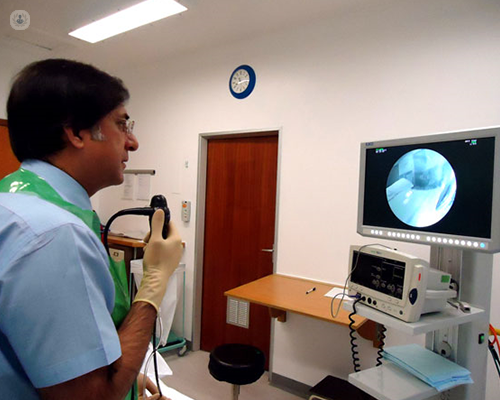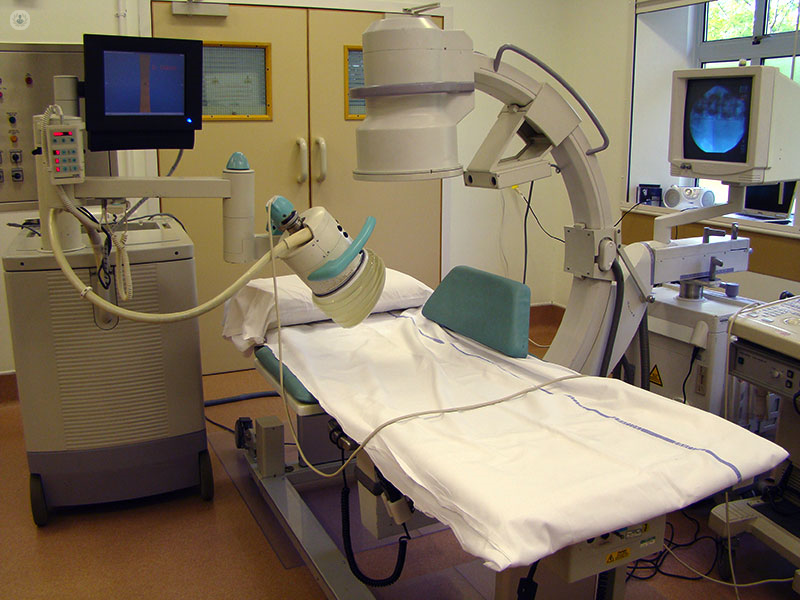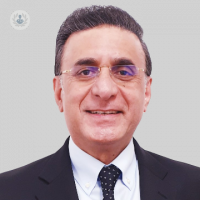Lithotripsy (shock wave therapy) for kidney and ureteral stones
Written by:Extracorporeal shockwave lithotripsy (ESWL) is a non-invasive procedure that aims to break up kidney stones into fragments so that they can exit your body naturally. Learn from a leading consultant urologist and kidney stones specialist, Mr Haider Syed, about what’s involved and what to expect on the day of your lithotripsy procedure. He also highlights possible complications and explains aftercare.

What is lithotripsy?
This purpose of extracorporeal shockwave lithotripsy (ESWL) is to break up large kidney and ureteral stones (around 5mm and larger) that have obstructed the kidney and/or ureter into smaller fragments. These shockwaves are created from outside the body with a machine called a lithotripter.
Once these high energy shockwaves have broken up the stones, the fragments should be able to pass through the body naturally. However, if the stones are still too large, surgery or more invasive procedures might be necessary.

Who can have the procedure?
Lithotripsies are the most common procedure for patients with kidney stones. However, some factors might impact your eligibility for the procedure:
- Weighing over 120kg (around 19 stone)
- Having a history of blood clots
- Being pregnant
In a case where lithotripsy isn’t the most suitable option, there are alternatives such as keyhole surgery or methods that involve passing a telescope through the bladder. To find out if you are eligible for lithotripsy, you’ll need to have a discussion with your specialist who will evaluate your specific case.
Your urologist will ask about your medical history. Be sure to let them know about the following at your initial consultation:
- If you take medication that prevents blood clots (such as Aspirin, Warfarin or Clopidogrel)
- If you have a pacemaker
How do patients prepare for lithotripsy?
Before having the procedure, patients are asked to:
- Continue routine medications as normal (unless advised otherwise by a medical professional)
- Don’t eat anything four hours before the procedure (but you can still drink freely) – if diabetic, please continue with your normal diet
- Arrange someone to pick you up after the procedure or to accompany you on public transport.
What happens during the procedure? How is it performed?
The procedure is done on an outpatient basis, meaning you won’t need to stay in a hospital or clinic overnight, and takes about an hour to perform.

Before you have the procedure, you’ll undergo some tests:
- An x-ray (to determine the size and location of the stone(s)
- Routine urine test
- Blood pressure test
- An electrocardiogram (ECG) to identify any risk factors
After signing a consent form, the procedure will go ahead.
- You’ll be positioned on the lithotripsy table and connected to monitoring equipment
- An x-ray or ultrasound scan will be used to determine the stone’s position
- Once the scan has located the stone, you’ll be given painkillers (if needed) via a needle inserted into a vein in your arm
- During the treatment, you must lie still. The lithotripter will be placed over the area with the stone(s), which are broken up by the high energy shockwaves
- If you experience pain, you can request more medication.
After the procedure
Once the treatment has finished, you’ll rest in the recovery area and once you have been observed, you’ll be discharged. Please allow for approximately two hours for your visit. It’s common for patients to feel some minor abdominal discomfort after lithotripsy but you’ll be prescribed some painkillers after treatment.
You’ll be advised to drink plenty of water to help flush out the stone fragments following treatment.
Are there possible complications?
After your treatment, it’s likely that you will pass a small amount of blood in your urine for a few days. You might also feel an excessive need to urinate and potentially some bruising on your back.
If you have symptoms of infection (such as fever) or have severe and persistent pain, immediately contact your GP or go to your nearest accident and emergency department.
How long do patients need to stay off work?
How long you need off work depends on the type of work you do. Ask your consultant for advice regarding returning to work and completing your leisure and household activities – they will be able to provide you with guidance for your personal circumstances.
Can I drive after the procedure?
You should avoid driving for 24 hours after the procedure. As mentioned previously, you’ll be advised to arrange someone to drive you home or accompany you on public transport after the procedure - this is due to the sedative medications used.
Are follow-up visits and treatment needed?
Fragmented kidney stones might take a few weeks to exit the body via urine. You’ll be asked to return for a follow-up visit a few weeks after your procedure. During this follow-up, you’ll have an x-ray to check the results. Similarly to your pre-treatment visits, it’s important to tell your doctor about any medicines you are taking and to bring them with you. Depending on the results at your follow-up and if the stones were very large, you might need to have lithotripsy a second or third time.
Mr Syed has leading expertise in performing lithotripsy among all alternative kidney stone removal procedures – see his profile to discover how Mr Syed can help you and arrange your consultation.


